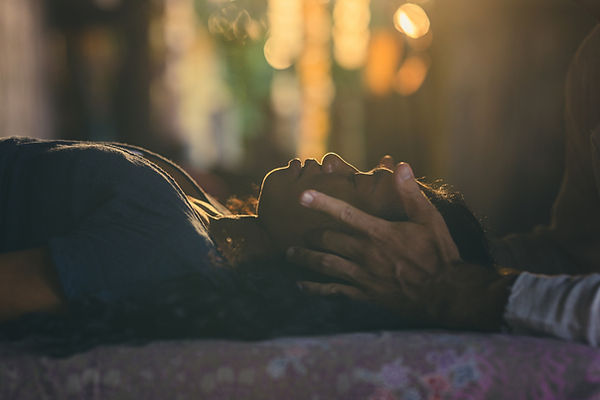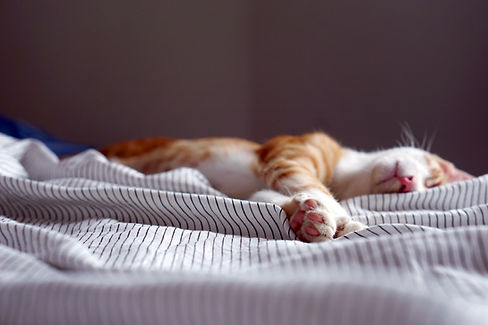Sleep
Quality sleep is the foundation of vitality. It supports physical recovery, mental calm, emotional release, and the integration of lived experiences — nurturing memory and inner balance.
To reconnect with restorative sleep, the combination of Traditional Chinese Medicine, Osteopathy, and Sound Therapy offers a complementary and coherent approach. These practices address underlying imbalances, restore energetic flow, and soothe the nervous system.

Sleep disorders - Reasons for Consultation
-
Difficulty falling asleep
-
Frequent awakenings
-
Other types of insomnia
-
Mental restlessness
-
Emotional disturbances
-
Daytime drowsiness
-
Sleepwalking
-
Sleep Apnea (Central or Obstructive)
-
Bedwetting / Nocturia
-
Excessive dreams
-
Nightmares
-
Night terrors
-
Recurring dreams
-
Circadian rhythm desynchronization (jetlag)
These issues are addressed during in-person consultations (more info here).
The Functions of Sleep
Why do we sleep?
Science doesn’t offer a single answer yet, but research agrees that sleep plays several vital roles for human health.
Each sleep cycle lasts between 90 and 110 minutes and includes different phases:
-
Deep slow-wave sleep (N3) is the most restorative for the body. It supports tissue repair, immune function, and the release of key hormones like growth hormone (Van Cauter et al., 2000).
-
REM sleep, associated with dreaming, is crucial for the brain. It consolidates memory, processes emotions, and integrates daily experiences (Stickgold et al., 2001).
Even without visible physical damage, sleep deprivation can cause nervous fatigue, mood instability, reduced cognitive performance, and increased risk of depression (Horne, 1988; Riemann & Voderholzer, 2003).
Throughout the night, the brain organizes and stabilizes what we’ve experienced:
-
Deep sleep enhances declarative memory (facts and knowledge).
-
REM sleep strengthens procedural memory (skills and actions).
A lack of sleep weakens attention, learning, emotional regulation, and stress resilience.
Sleeping well is essential for physical, mental, and emotional regeneration — a key to maintaining inner alignment.
🔎 To go further
Discover the article Sleep Uncovered: Functions, Physiology and the Role of Dreams, an analysis of the physiological mechanisms of sleep and the role of dreams, supported by scientific research.

Traditional Chinese Medicine (TCM) offers a holistic perspective on sleep.
Rather than treating symptoms alone, it seeks to address the root imbalances that disturb restful nights.
Acupuncture, in particular, has targeted effects on the nervous system.
It regulates the sleep-wake cycle, calms the mind, and reduces stress — a frequent cause of insomnia.
By stimulating specific points, it may:
-
Promote relaxation by modulating calming neurotransmitters like serotonin and GABA, reducing anxiety and tension.
-
Stimulate endorphin release, promoting well-being and supporting melatonin production — the key hormone for sleep.
-
Restore emotional balance, as TCM links sleep disorders with mental agitation and emotional turbulence.
-
Harmonize the gut-brain axis, improving digestion and assimilation, which are vital for producing sleep-related neurotransmitters.
With regular sessions, we work together to restore deep and stable sleep while cultivating calm and presence in daily life.
Chinese Medicine— A Comprehensive Approach to Restorative Sleep

Osteopathy and Sound Therapy —
A Valuable Duo to Regain Restful Sleep
Sleep disturbances aren’t always mental in origin: physical tension, nervous overload, or internal rhythm imbalances can also play a role.
Osteopathy and sound therapy provide a complementary approach to support these aspects.
-
Osteopathy, by releasing muscular tension and improving the mobility of the diaphragm and cranial structures, promotes overall bodily relaxation.
It encourages deep breathing and physical ease that supports falling asleep. -
Sound therapy works through the use of vibrations and specific frequencies (tuning forks, singing bowls…).
It helps slow brainwaves toward alpha and theta frequencies — associated with deep relaxation and the onset of sleep.
By combining both modalities, body and mind realign, opening the way to stable, deep, and regenerative sleep.
🔎 Also worth reading
Sound Baths and Sleep: A Scientific Perspective explores the measured effects of sound therapy on sleep according to recent studies.
Guidance & Practices
Receiving treatment at the clinic is a key step, but your personal involvement plays a crucial role in creating long-lasting improvements in your sleep. It’s not just about attending a few sessions—it’s about integrating practices and habits that extend and amplify their benefits.
Among the most supportive practices, Qi Gong and Yoga Nidra are especially helpful. These disciplines calm the nervous system, settle the mind, and support energetic balance—laying the foundation for deeper, more restorative sleep.
Daily lifestyle tips
-
Take a hot bath about one hour before bedtime . This temporarily raises core body temperature, which then drops—mimicking the natural cooling that helps initiate sleep.
-
Restrict access to your bedroom and bed to a fixed time window, for example from 1am to 7am or 2am to 8am. Avoid falling asleep beforehand (e.g., in front of the TV), and stick to the same wake-up time every day—including Sundays. This method helps reset internal synchronizers and break the association between the bed and the nightly struggle with insomnia.
-
Naping : If needed, naps should be limited to 30 minutes and taken only between 2pm and 5pm. Avoid sleeping at other times of the day.
-
Light : Sleep in a completely dark room—block out early morning light with curtains or blinds. Artificial light simulating daylight or light therapy devices can also help realign circadian rhythms.
-
Diet : Avoid caffeine at least 10 hours before bedtime and alcohol at least 4 hours before. In general, favor light, starchy meals over protein-rich ones. Carbohydrates stimulate insulin release, increasing the relative level of tryptophan, which promotes serotonin production in the brain—an important neurotransmitter for sleep.
-
Snoring and nocturia (frequent nightime urination) are both common causes og insomnia and should be actively addressed.
-
Jet lag : For frequent travelers crossing multiple time zones, it’s important to realign internal clocks. During the flight, drink water but avoid food, and eat only once adjusted to the local time at your destination.
The Taoist Sleeping Posture
The Taoist Deer Posture is a traditional position used to support peaceful falling asleep and deep rest.
It closely resembles the Reclining Lion posture in Buddhism:
-
Lie on your right side
-
The right arm is bent at the elbow, palm facing upward, placed in front of the face
-
The left arm rests along the body, with the elbow on the hip and the hand hovering in front of the abdomen
-
The right leg is extended, and the left knee is bent and resting in front of the right thigh
This position supports digestion, slows the heart rate, and anchors attention into the body — offering a simple yet powerful gateway into sleep.


Qi Gong for Sleep
Coming soon
